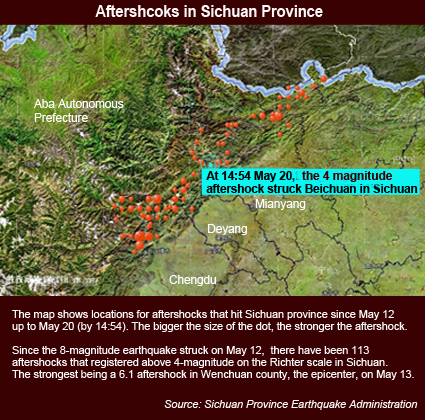SICHUAN EARTHQUAKE
Published:
2008-05-20

Spurred by conflicting reports over the possibility of aftershocks, residents of Tianshui city in Gansu province have been sleeping on open ground for days.
The makeshift shelters made of plastic sheets and iron pipes have been mushrooming in open spaces across the city. In fact, all tents have been sold out in this city with over three million people.
Word of strong aftershocks to hit Gansu province, just next door of Sichuan where a 8-magnitude earthquake hit a week ago, have been circulating around for days, fueling the panic.
By three in the morning on May 20, all open spaces around the Jihe riverbanks had been occupied by squatters anxious to avoid being caught indoors in the event the predictions come true. Many also opted to sleep inside parked cars.
News of Strong Aftershocks
Earlier, at one in the morning, the Gansu Satellite Network reported that between May 20 and 22, aftershocks from 6 to 6.5 or more magnitude would strike again, covering areas from Nanba town of Pingwu county in Sichuan to Bikou of Wen county in Gansu province. The network called for the public to be on the alert and stay prepared.
Wen county is part of Longnan City. It is the nearest county in Gansu to the epicenter of Wenchuan county in Sichuan; while Tianshui city is located next to Longnan City.

Many residents in Tianshui who learned of the news through short messaging systems were confused. They were used to the local and national networks like CCTV to reporting on the disaster in Sichuan, but Gansu was rarely touched upon.
Adding to the confusion was that some nine hours after the initial warning, the Gansu municipal television network aired contradicting news at 9am. The station quoted an official from the Earthquake Administration as saying that chances for major aftershocks to hit the province were slim. The official appealed for the public to live normally and maintain order.
Gripped by fear and panic, Tianshui residents basically disregarded the latter appeal. Instead, some skipped work, and some went scouting for the best possible spot for relocating family members.
"We would rather to be safe than sorry," said one resident working with the city Tax Administration. He added that the municipal government didn't issue any notice.
"They did call for the public to stay on the alert and be prepared, but how to prepare? Where are the safe places? " he asked.
Contradictory Statements by the Official
At 11:10am, EO reporter managed to get in touch with Gansu Earthquake Administration and a staff confirmed that strong aftershocks were imminent in the following days, affecting areas that included Tianshui.
When asked if the aftershocks would spread to the nearby Shaanxi province, the staff replied: "That is the business of the Shaanxi administration. We cannot comment about that."
The confirmation was a sharp contrast to a press conference held by the Administration just a day ago. Its director Yang Liming had reportedly told the media that rumors of strong aftershocks to hit Gansu's Wuwei, Lanzhou, Tianshui, and Pingliang were unlikely to happen.
However, by the wee hours of May 20, Gansu's disaster relief headquarter published a notice warning about aftershocks measuring 6 or above 6.5-magnitude in days to come, thus the news appeared on television.
To the public's disbelief, these two contradictory pieces of information were published alongside eachother in the provincial government official website.
On May 20 alone (up to 14:54), five aftershocks measuring above 4 on the Richter scale had occurred in nearby Sichuan. The strongest one being a magnitude 5.1 aftershock that took place in Pingwu county at 01:52.
Translated by Liu Peng
Related
Aticles
- Chinese Solidarity to Stay off Amusement | 2008-05-21
- Wenchuan Dodges a Blow; Wenxian Braces for Aftershock | 2008-05-21
- Locations of Aftershocks in Sichuan (May 12 - 20) | 2008-05-20
- Yinxing: Rotting Away | 2008-05-20
- Mourning for Quake Victims | 2008-05-19











